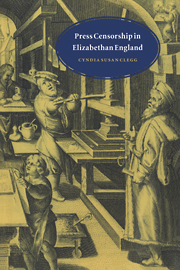Preface
Published online by Cambridge University Press: 23 December 2009
Summary
Renaissance literary studies have been engaged of late in a lively reappraisal of the interrelationships of literature, politics, and culture in early modern England. At the same time that this enterprise has embraced the new by grounding its rereading of early modern texts in postmodern theory, it has been remarkably remiss in failing to reconsider those “old” assumptions that shaped political and historical studies – particularly with regard to print culture. This methodological dichotomy has yielded an interesting conundrum. We have come to accept literature as highly political and the political system governing press control as highly repressive. This would hardly be problematic except for the widely accepted premise that the principal end of press control in early modern England was to rout out discourse that did not uphold the state's religio-political hegemony. In Censorship and Interpretation, Annabel Patterson has proposed an appealing way out of this contradiction – functional ambiguity, that is, a code of discourse accepted by both authors and the state that allowed religio-political discourse to be contained by linguistic indeterminacy. Ironically, Patterson's work has served as fundamental to new historicist and cultural materialist studies at the same time that these studies have collapsed the notion of literature that enables Patterson's hermeneutics of censorship. Functional ambiguity works best for what Renaissance writers called “poesy,” but historicist/cultural studies have exploded our concepts of literature to include a vast array of texts. This expanded notion of text and intertextuality, confronting us as it does with so many more of those “puzzling incidents of noncensorship” noted by Patterson than poesy, springs the lock of prevailing assumptions about press control.
- Type
- Chapter
- Information
- Press Censorship in Elizabethan England , pp. xi - xviPublisher: Cambridge University PressPrint publication year: 1997

